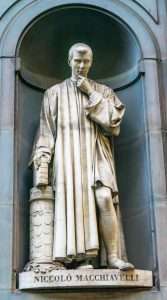As today’s society faces social turmoil, inflation, and lowered aspirations, students of history realize that many of today’s challenges are nothing new. Wars, diseases, disenfranchisement, and economic upheaval are part of the human experience. The history of civilization has always been about competing interests, power, and control. And yes, money.
Yet, many people today behave as if these things are unique only to current society. And by not being a student of history and learning how opportunities often derive from instability, these individuals rarely experience independence, control, and upward mobility.
Such myopia is an opportunity for strategic introverts to steer the direction of society. Based on their preference for academia, strategic introverts can transform the world by visiting the works of Charles Darwin, Niccolò Machiavelli, and William Shakespeare to navigate and create a robust financial future.
As guiding principles, many people would have a change of fortune if only they considered three realities: 1). All societies are built on an economic system, whether it’s the bartering of goods and services or the exchange of legal tender, 2.) Most relationships are conditional and transactional, and 3.) The value of individuals increases proportionate to the education and skills they bring to the marketplace to satisfy needs.
When individuals reject the basis of what economic markets accomplish for innovation, prosperity, and higher qualities of life, they exacerbate their discontentment.
By reviewing critical constructs of how historical figures use economics to succeed.
Only by adopting the philosophy of transformational thinkers can these introverts tie their happiness and fortunes to the future.
Idealism vs. Realism
Viewing the world as it exists is critically essential instead of misplaced idealism. Although facts and data can be manipulated, those who use the information to guide purposeful direction are best suited for sustainable success. Those who oppose this notion are relegating themselves to a level of victimhood.
Victims believe that society is responsible for creating options for their happiness.
Freddy Davis of Market Faith Ministries asserted that:
A Naturalistic understanding of economics begins with the belief that there is no supernatural existence. As a result, the only principles that guide economics are those which advance the goals of human society. Based on Naturalistic thought, the species (society) rather than the individual takes precedent. The tendency that emerges from that is an approach to doing economics that tries to promote the welfare of society above the welfare of the individual. This generally involves some kind of central guidance by those who control the purse strings of society.
The key to Davis’ assertion is that the welfare of society takes priority over an individual. If the marketplace is society, the activity of the individual helps or hinders societal development.
And the individual must know the economic mores and rules that serve as guiding principles for maneuvering within society.
Financial writer, Adam Hayes, said the focus of Game Theory:
…Serves as a model of an interactive situation among rational players. The key to game theory is that one player’s payoff is contingent on the strategy implemented by the other player.
Under Game Theory, participants must anticipate the behavior of the next player. The critical part of Game Theory is the willingness to participate effectively to make the best decisions.
Hayes further outlined that Game Theory presumes that all actors have the necessary information about the game, the rules, and the consequences. Also, players do not communicate with each other, and any decisions are deemed final.
How Darwin, Machiavelli, and Shakespeare guide strategic introverts toward financial independence
Strategic introverts are the personality types most apt to use history, psychology, sociology, and natural science to maneuver in life to achieve financial success for greater control and independence.
They are also most adaptable to intellectual frameworks that garner exceptional progress in changing environments.
English naturalist Charles Darwin developed the idea of natural selection, which posits that populations of living organisms adapt and change over time. Individuals most adaptable within an environment will survive, while those least flexible will die out.
For Darwin, the notion of natural selection, adaptability, and “Survival of the fittest” was not merely a natural phenomenon but practical in human interactions.
Reportedly, Darwin lived according to his theories.
Vikram Doctor, the editor for The Economic Times, wrote:
If Darwin had been forced to be a professional academic scientist, he might have had to waste time with lectures and institutional responsibilities. He would also have faced problems engaging directly with evolution, a theory that was still anathema in many academic circles.
But thanks to sound financial advice from his father, a prosperous doctor, Darwin put his money in a large country house, far from the chaos of the cities, where he could concentrate on slowly developing and buttressing his theories. The balance of his money went into a sensible mix of land and securities, particularly in the new railroad projects.
Darwin realized that control and independence rested on financial solvency.
Aligned with Darwin’s natural selection, political strategist Niccolò Machiavelli suggested that individuals do whatever is necessary and most effective for optimal results.
Richard Dawkins’ “The Selfish Gene” qualifies Machiavelli’s premise based on the notion that human genes are relentlessly selfish in their quest for survival.
For this sake, Niccolò Machiavelli is credited with asserting that the ends always justify the means. In this vein, you would look at the results desired and work backward in extracting what tactics are necessary for success.

During the 14th century, Machiavelli wrote about what he thought were the critical aspects of achieving and maintaining power. He witnessed the failures of leaders when they attempted to be kind and generous when the solution called for a firmer and more vigorous response.
Contrarily, he saw the results when leaders used excessive force to maintain control, only for the sword to turn against them.
So, he famously suggested that an effective leader should do whatever is necessary or best for the situation.
In contemporary times, Machiavelli would suggest that strategic introverts objectively adopt philosophies that lend themselves to being free agents.
These introverts would only act rationally towards the attainment of their goals.
In the field of ideas, practical, evidence-based concepts should only be considered for advancement.
When developing a strategic plan, it is essential to understand the value system of the people you are attempting to reach.
Machiavelli would suggest that catering to ideas and beliefs already held by individuals is better than trying to change their minds.
William Shakespeare once said, “I make new words out of old words.”
And Solomon reports in Ecclesiastes 1:4-11, “There is nothing new under the sun.”
For strategic introverts, Shakespeare and Solomon would suggest that strategic introverts’ years of reading, writing, and reflection have prepared them to see opportunities others might miss.
Their preternatural ability to spot patterns in the market gives them an advantage for innovations and product development.
There is no better time than now to use technology to sell and share ideas in the marketplace.
The world will continue in turmoil with its competing interests. Still, the opportunity for problem-solving products and services is abundant.
Darwin, Machiavelli, and Shakespeare show that life is won by the competitive and adaptable.
Those who do what is best for the marketplace will do good and well, simultaneously.
And everything has already been created.
Strategic introverts must decide what to do with their ideas and insights within commerce.
You are the change in the world that you are seeking.
By not acting, you are betraying yourself.
—Helen Dolan

References
Berkley, W.E. (2012, Aug.) There is nothing new under the sun. The Expository Files. Retrieved from: https://bit.ly/3DYyXNn.
Davis, F. (2010). Worldview and Economics. Market Faith Ministries. Retrieved from: https://bit.ly/317cD5B.
Doctor, V. (2009, Fe. 12). Smart money funded Darwin’s evolution. The Economic Times. Retrieved from: https://bit.ly/3I364BV.
Hayes, A. (2021, April 28). Game Theory. Investopedia. Retrieved from: https://bit.ly/3rfdDzL.
Natural Selection (n.d.). National Geographic. Retrieved from: https://bit.ly/3AGdgQ2.
William Shakespeare Image (n.d.). Tonynetone. Retrieved from: https://bit.ly/3xyroKK.

